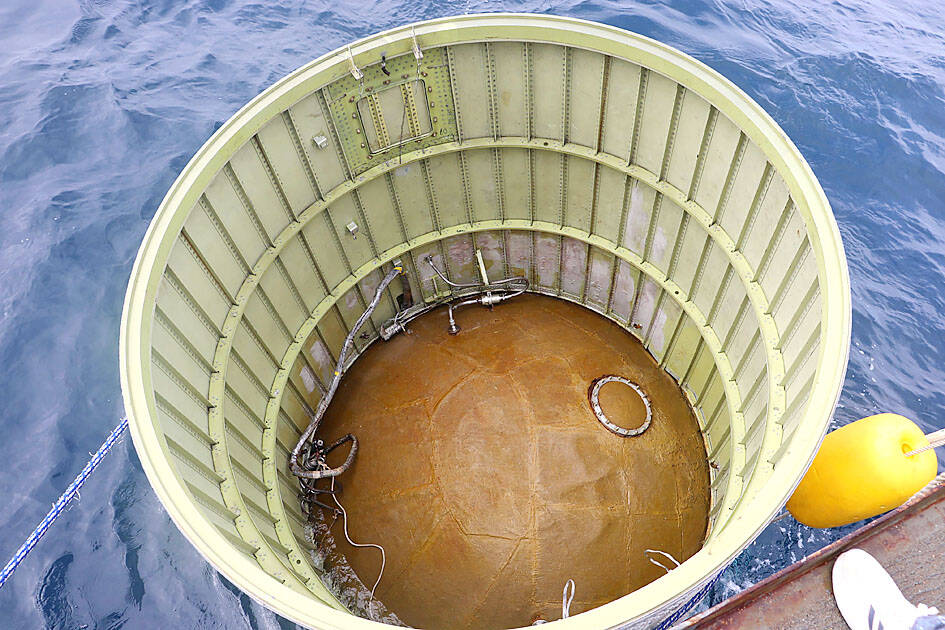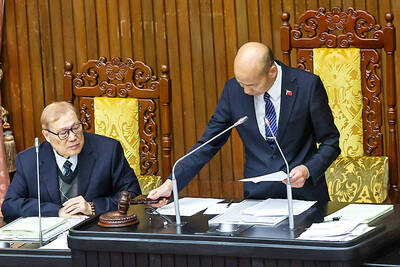North Korea attempted to launch a spy satellite yesterday, but it crashed into the sea after a rocket failure, with the South Korean military retrieving part of the likely wreckage in a potential intelligence bonanza.
North Korea does not have a functioning satellite in space and North Korean leader Kim Jong-un has made developing a military spy satellite a top priority for his regime, despite UN resolutions banning its use of such technology.
Pyongyang had said in the buildup to the launch attempt that the satellite would be vital to monitoring the military movements of the US and its allies.

Photo: AFP / South Korean Ministry of National Defense
However, the rocket lost thrust and plunged into the sea with its satellite payload, the official Korean Central News Agency reported.
It added that authorities would investigate the “serious defects” revealed by the launch and conduct another test as soon as possible.
South Korea’s military said it had managed to locate and salvage a portion of the suspected debris.
It released images showing a large barrel-like metal structure with thin pipes and wires at the bottom, which experts said might be a liquid fuel tank.
“Technical experts will be able to gain tremendous insight into North Korea’s proficiency with large, multi-stage boosters from the recovered debris,” US-based analyst Ankit Panda said.
The launch prompted confusion and panic in Seoul, as city authorities sent an early morning emergency evacuation alert to residents and blasted an air-raid siren across the downtown area.
This sparked widespread consternation online, before the South Korean Ministry of the Interior clarified minutes later the alert had been “incorrectly issued.”
“I was taking my two young children to a basement parking lot as advised, in shock,” a 37-year-old father who asked to be identified by his surname, Yoon, told reporters.
The correction left him “speechless and outraged,” he said.
Japan briefly activated its missile alert warning system for the Okinawa region early in the day, lifting it after about 30 minutes.
Seoul, Tokyo and Washington all slammed the launch, which they said contravened a raft of UN resolutions barring Pyongyang from any tests using ballistic missile technology.
UN Secretary-General Antonio Guterres called for North Korea to cease “such acts” and return to the negotiating table.
“Any launch using ballistic missile technology is contrary to the relevant Security Council resolutions,” he said in a statement.
Because long-range missiles and rockets used for space launches share the same technology, analysts say developing the ability to put a satellite in orbit would provide Pyongyang with cover for testing its banned intercontinental ballistic missiles.
In 2012 and 2016, Pyongyang tested ballistic missiles that it called satellite launches. Both flew over Japan’s southern Okinawa region.
Prior to yesterday’s launch, Pyongyang had launched five satellites since 1998, three of which failed immediately and two of which appeared to have been put into orbit. Signals from those launches have never been independently detected, indicating they might have malfunctioned.

DEFENDING DEMOCRACY: Taiwan shares the same values as those that fought in WWII, and nations must unite to halt the expansion of a new authoritarian bloc, Lai said The government yesterday held a commemoration ceremony for Victory in Europe (V-E) Day, joining the rest of the world for the first time to mark the anniversary of the end of World War II in Europe. Taiwan honoring V-E Day signifies “our growing connections with the international community,” President William Lai (賴清德) said at a reception in Taipei on the 80th anniversary of V-E Day. One of the major lessons of World War II is that “authoritarianism and aggression lead only to slaughter, tragedy and greater inequality,” Lai said. Even more importantly, the war also taught people that “those who cherish peace cannot

STEADFAST FRIEND: The bills encourage increased Taiwan-US engagement and address China’s distortion of UN Resolution 2758 to isolate Taiwan internationally The Presidential Office yesterday thanked the US House of Representatives for unanimously passing two Taiwan-related bills highlighting its solid support for Taiwan’s democracy and global participation, and for deepening bilateral relations. One of the bills, the Taiwan Assurance Implementation Act, requires the US Department of State to periodically review its guidelines for engagement with Taiwan, and report to the US Congress on the guidelines and plans to lift self-imposed limitations on US-Taiwan engagement. The other bill is the Taiwan International Solidarity Act, which clarifies that UN Resolution 2758 does not address the issue of the representation of Taiwan or its people in

The Philippines yesterday criticized a “high-risk” maneuver by a Chinese vessel near the disputed Scarborough Shoal (Huangyan Island, 黃岩島) in a rare incident involving warships from the two navies. The Scarborough Shoal — a triangular chain of reefs and rocks in the contested South China Sea — has been a flash point between the countries since China seized it from the Philippines in 2012. Taiwan also claims the shoal. Monday’s encounter took place approximately 11.8 nautical miles (22km) southeast” of the Scarborough Shoal, the Philippine military said, during ongoing US-Philippine military exercises that Beijing has criticized as destabilizing. “The Chinese frigate BN 554 was

LEISURE: The new law adds Confucius’ birthday, the anniversary of the Battle of Guningtou, Constitution Day and Little New Year as national holidays The Legislative Yuan yesterday passed new legislation adding four national holidays and making Workers’ Day a national holiday for all sectors. The Chinese Nationalist Party (KMT) and the Taiwan People’s Party used their combined majority in the legislature to push the jointly proposed draft through its third and final reading. This new law supersedes the existing regulations for the implementation of memorial days and state holidays, which are administered by the Ministry of the Interior. The new law recognizes Confucius’ birthday on Sept. 28, the anniversary of the Battle of Guningtou on Oct. 25, Constitution Day on Dec. 25 and “Little New Year,”